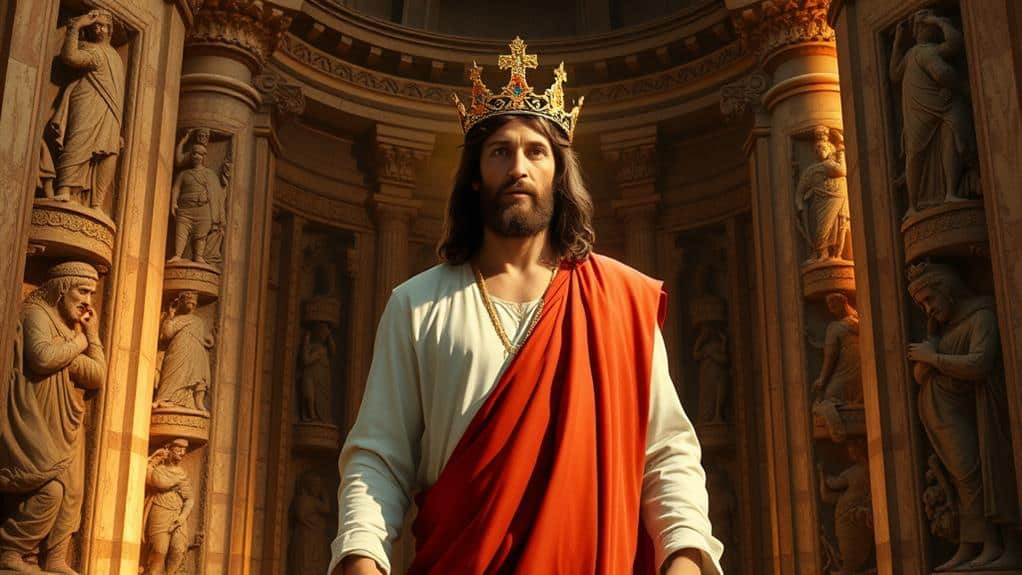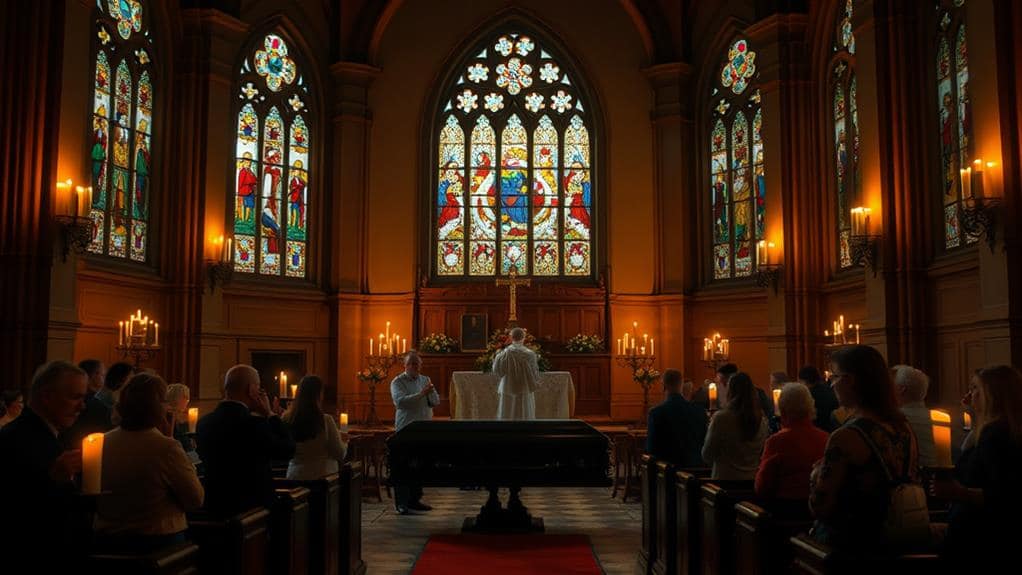The age-old question: "God, why?" – because clearly, Google doesn't have all the answers. As you search for reasons behind life's struggles and divine intentions, you're likely seeking comfort in the face of suffering or evil, questioning the notion of an all-powerful and benevolent God. Embracing paradoxes can deepen your understanding of the divine, and navigating doubt can lead to personal growth and redefined faith, helping you make sense of the complexities surrounding the question "God, why?".
Key Takeaways
- Divine sovereignty and human autonomy coexist, with human agency integral to God's plan, amidst tensions between control and freewill.
- The presence of evil and suffering challenges the notion of an all-powerful and benevolent deity, raising questions about divine justice and power.
- Faith is tested by doubt and uncertainty, but confronting these challenges can strengthen faith and foster emotional resilience and trust in God's plan.
- Spiritual growth and meaning can arise from navigating suffering, doubt, and existential questioning, leading to transformative experiences and new perspectives.
- Hope and resilience can be found in understanding suffering as part of divine providence, acknowledging its value in catalyzing growth and new insights.
Questioning God's Intentions
Walking the fine line between faith and skepticism, you may find yourself grappling with the existential questions that have puzzled theologians and philosophers for centuries.
As you delve into the depths of theological inquiry, you're forced to confront the paradox of divine purpose and human autonomy. Can an omnipotent God impose a predetermined plan on humanity without undermining individual freedom? Conversely, does human agency negate the possibility of a predestined purpose?
Philosophers have long debated the topic, proposing various solutions to reconcile the seeming contradiction. Some argue that divine sovereignty and human autonomy operate in tandem, with God's providence unfolding through the choices and actions of individuals.
Others propose that human freedom is itself an aspect of the divine plan, with God's purposes realized through the outworking of human decisions. As you grapple with these concepts, you're compelled to consider the intricate dance between divine guidance and human volition, leading you to question God's intentions in the grand scheme of human existence.
In this context, suffering can act as a catalyst for spiritual growth and deeper self-awareness, with many religious traditions interpreting it as a test of faith that refines beliefs.
The Problem of Evil
You're now faced with the problem of evil, which challenges the idea of an all-powerful and benevolent God in the face of human suffering.
As you consider the causes of this suffering, you must also examine the relationship between evil and God's sovereignty, questioning whether God's power is limited by the existence of evil or if evil serves a greater purpose.
Ultimately, your understanding of God's role in the world hinges on your ability to reconcile the reality of evil with the concept of a loving and all-knowing deity. The complexities of divine justice highlight the need to balance the allowance of suffering with the nature of an all-powerful God.
Causes of Human Suffering
Human existence is marked by the inescapable duality of joy and suffering, with the latter often manifesting as an existential affront to the notion of an all-powerful, benevolent deity.
You're compelled to ask: what're the causes of human suffering? As you ponder this question, you start to consider the complexities of human experience. On one hand, suffering can be a catalyst for human resilience, prompting individuals to develop coping mechanisms and strategies for navigating adversity.
On the other hand, it can also lead to spiritual growth, as people turn to their faith or spirituality for comfort and solace.
Some possible causes of human suffering include:
- Natural evil: suffering caused by natural disasters, diseases, or other events beyond human control.
- Moral evil: suffering caused by human actions or decisions, such as violence, abuse, or exploitation.
- Existential suffering: suffering arising from the human condition itself, including feelings of meaninglessness, isolation, or mortality.
As you grapple with the causes of human suffering, you're forced to confront the darker aspects of existence.
Yet, even in the midst of suffering, you may discover opportunities for growth, transformation, and redemption.
Moreover, the divine purpose behind pain is often seen as transformative rather than punitive, leading to deeper understanding of self and existence through the process of spiritual growth.
Evil and God's Sovereignty
The presence of evil in the world poses a significant challenge to the notion of an all-powerful, benevolent God, raising questions about the nature of divine sovereignty and the existence of suffering.
As you grapple with this moral paradox, you're forced to consider the relationship between God's power and the presence of evil. If God is all-powerful, why doesn't He eradicate evil?
On the other hand, if God is benevolent, why does He allow evil to persist? These questions underscore the tension between God's sovereignty and the existence of evil.
One possible explanation is that evil serves a divine purpose, one that's beyond human comprehension. This perspective posits that evil isn't a contradiction to God's sovereignty, but rather a means to an end, with the ultimate goal being the realization of a greater good.
However, this raises further questions about the nature of this greater good and the role of human suffering within it.
Ultimately, the problem of evil remains a complex, deeply philosophical issue that challenges your understanding of God's sovereignty and the human experience.
The correlation between sickness and spiritual growth highlights the importance of spiritual resilience in navigating life's hardships.
Faith in Times of Doubt
As you navigate the complexities of faith in the face of uncertainty, you must consider what constitutes true faith and whether it can withstand the challenges of doubt.
You may experience a crisis of belief, where your trust in a higher power is tested by unanswerable questions and seemingly inexplicable events.
In such moments, your ability to trust in God's plan, even when it's unclear, becomes the crux of your spiritual resolve.
Spiritual community offers much-needed emotional resilience as you grapple with the difficulties of faith in the face of uncertainty.
Defining True Faith
Beyond the threshold of comfort and familiarity, faith is often tested by the trials that prompt us to question everything.
You're forced to re-examine your values, your understanding of the divine, and your place in the world. This is where the true essence of faith comes into play – a faith that's not just about passive acceptance but about active exploration and growth.
As you navigate your faith journey, you'll encounter various dimensions that challenge and refine your understanding of true faith. Here are a few key aspects to consider:
- Embracing the unknown: True faith involves acknowledging the mysteries that lie beyond human comprehension. You learn to trust in the unknown, even when it doesn't make sense.
- Confronting doubt: Your faith is strengthened when you confront and work through your doubts, rather than suppressing or avoiding them.
- Nurturing spiritual growth: True faith isn't static; it's a dynamic process of growth, where you continually seek a deeper understanding of yourself and the divine.
Through these aspects, you'll discover a faith that's not just about finding answers but about embracing the questions, and allowing them to propel you towards spiritual growth. Suffering can also serve as a catalyst for growth, transforming struggles into opportunities for spiritual enrichment.
Crisis of Belief
Doubt creeps in, shattering the illusion of certainty that once sustained you. As you navigate the uncharted territories of faith struggles, a belief crisis unfolds, prompting existential questions that challenge the very foundations of your convictions.
You begin to experience spiritual doubts, which not only assail your confidence in a higher power but also lead to a perceived divine silence that intensifies the turmoil brewing within.
Your faith challenges escalate as you start questioning beliefs that previously seemed absolute. These uncertainty moments can be particularly disorienting, making it difficult to discern what's real and what's a product of your wavering emotions.
Yet, instead of suppressing these doubts, you may need to explore and confront them head-on to reestablish a more authentic relationship with your faith. By delving into the depths of your faith struggles, you may ultimately emerge with a stronger sense of self and a renewed perspective, even if that means redefining what faith means to you.
#
Trusting God's Plan
Navigating the dark waters of doubt, you may find yourself at a crossroads, torn between holding onto the fragments of a shattered faith and embracing the uncertainty that threatens to consume you.
As you struggle to reconcile your expectations with the harsh realities of life, you're forced to confront the limitations of your own understanding. Trusting God's plan in times of doubt requires a profound surrendering of control, acknowledging that the divine timing of events is beyond human comprehension.
Consider the following aspects of surrender:
- Letting go of the need for answers: You release the expectation that you'll understand the why behind every event or circumstance, recognizing that some mysteries may remain unsolved.
- Embracing the uncertainty: You acknowledge that the future is inherently uncertain and that faith involves trusting in a reality that transcends human knowledge.
- Redefining control: You shift your focus from controlling outcomes to influencing your own responses, recognizing that true power lies in your ability to choose how you react to life's challenges.
Searching for Meaning
In the midst of life's turmoil, you find yourself questioning the purpose of existence. As you navigate the complexities of human experience, you're compelled to confront the existential questions that have puzzled philosophers and theologians for centuries. Your search for meaning becomes an all-consuming quest, driving you to explore the depths of spirituality.
Through spiritual exploration, you seek to uncover the underlying purpose that governs the universe. You examine the intricacies of human existence, probing the mysteries of suffering, joy, and the human condition.
Your inquiry isn't merely intellectual, but deeply personal, as you strive to find significance in the midst of uncertainty. As you delve into the unknown, you begin to grasp the profound interconnectedness of all things.
Your search for meaning becomes a transformative journey, illuminating the complexities of existence and the nature of reality. In this pursuit, you may not find definitive answers, but you'll undoubtedly discover new perspectives, challenging your understanding of the world and your place within it.
Understanding God's Sovereignty
The concept of God's sovereignty raises fundamental questions about the nature of divine authority and its relationship to human existence. As you ponder the notion of divine control, you're faced with the paradox of human freewill. Can both coexist, or does one negate the other?
You're drawn to the idea that God's sovereignty implies a level of control over human affairs, yet you also value the concept of human freewill. This tension gives rise to several considerations:
- Determinism vs. Freedom: If God's sovereignty is absolute, does that mean human choices are predetermined, or can you still exercise freewill?
- Divine Intervention: To what extent does God intervene in human affairs, and how does this impact the concept of freewill?
- Responsibility and Agency: If God is sovereign, do humans bear responsibility for their actions, or is agency merely an illusion?
As you grapple with these questions, you're forced to confront the complexity of the relationship between divine control and human freewill.
Ultimately, understanding God's sovereignty requires embracing the tension between these two concepts, rather than trying to resolve it. By acknowledging this paradox, you can deepen your understanding of the divine and its relationship to human existence.
Finding Hope in Suffering
Your exploration of God's sovereignty has likely led you to confront the reality of suffering, raising profound questions about the nature of divine control and its relationship to human pain. You may wonder why an all-powerful, benevolent God allows suffering to exist. In grappling with this issue, you're forced to consider suffering's purpose and the role it plays in human existence.
Philosophers and theologians have long debated the concept of suffering, with some arguing that it serves as a catalyst for personal growth, while others see it as a consequence of human freedom. As you navigate this complex topic, you're compelled to reconcile the existence of suffering with the notion of an omnipotent, loving God.
Amidst this struggle, you may discover hope amidst pain. By acknowledging the inherent value of human experience, even in the face of suffering, you can begin to find meaning in the midst of turmoil. This perspective allows you to confront the reality of suffering without dismissing the possibility of divine providence, instead, finding solace in the idea that suffering can be transformative and redemptive.
## Trusting God's Plan
As you continue to grapple with the coexistence of suffering and divine sovereignty, trusting God's plan becomes an essential aspect of your spiritual journey. You begin to understand that God's ways aren't your ways, and His timing isn't your timing. Trusting God's plan requires you to relinquish control and have faith in His divine timing.
Consider the following aspects of trusting God's plan:
- Surrendering to the unknown: You acknowledge that you don't have all the answers and that God's plan is beyond your comprehension.
- Finding purpose in the pain: You begin to see that your suffering isn't meaningless, but rather a catalyst for growth and transformation, revealing a purpose that was previously unknown.
- Resting in God's sovereignty: You trust that God is in control, even when circumstances seem chaotic, and that His plan is unfolding with precision and intentionality.
As you trust God's plan, you begin to see that His purpose is revealed in the midst of suffering, and that His divine timing is perfect, even when it doesn't align with your expectations.
This trust allows you to find peace and comfort in the midst of uncertainty.
Embracing the Mystery
Beyond the realm of human understanding lies a profound mystery that beckons you to explore its depths. As you delve into the unknown, you'll encounter mystical experiences that challenge your perceptions and prompt you to reevaluate your understanding of the divine.
These experiences often involve divine paradoxes, where seemingly contradictory truths coexist, forcing you to confront the limitations of your knowledge. Embracing the mystery requires you to acknowledge the complexity of the divine and the finitude of your own understanding.
You must be willing to venture into the unknown, where the rational and the irrational, the logical and the illogical, intersect. This journey demands intellectual humility, as you surrender your need for definitive answers and instead, seek to comprehend the incomprehensible.
Frequently Asked Questions
Can My Prayers Change God's Will if It Is Absolute?
Your prayers raise questions about prayer effectiveness and divine intervention, sparking debates on whether communication with a higher power can alter absolute will, testing the relationship between free will and determinism in a theistic context.
Is God Limited by Human Free Will?
You consider the interplay between divine sovereignty and human agency, questioning whether the former is constrained by the latter, and whether the coexistence of these two concepts necessitates a reevaluation of the nature of freedom and control.
Why Doesn't God Prevent Suffering in the World?
You're grappling with the existence of suffering and its purpose, questioning why it isn't prevented; this inquiry probes the depths of divine wisdom, prompting an examination of the interplay between free will and the nature of reality.
Does Sin in the World Imply God's Lack of Control?
You face the paradox of reconciling the existence of sin with divine sovereignty. If sin's consequences prevail, does this imply a lack of control? Analytically, the two concepts aren't mutually exclusive, but intertwined aspects of reality.
Can Doubting God Lead to Losing Faith Forever?
As you navigate your faith journey, embracing doubt impacts your spiritual growth, leading to a refining process that can ultimately strengthen or redefine your convictions, rather than irreparably damaging them, depending on your response to uncertainty.
Conclusion
You've grappled with the age-old question, "God, why?" and explored the complexities of faith, doubt, and suffering. You've examined the problem of evil, the nature of God's sovereignty, and the search for meaning in adversity. Ultimately, you're left with a profound realization: embracing the mystery of God's ways is not a cop-out, but a courageous act of trust. In the face of uncertainty, you're called to trust God's plan, even when you can't understand it.






